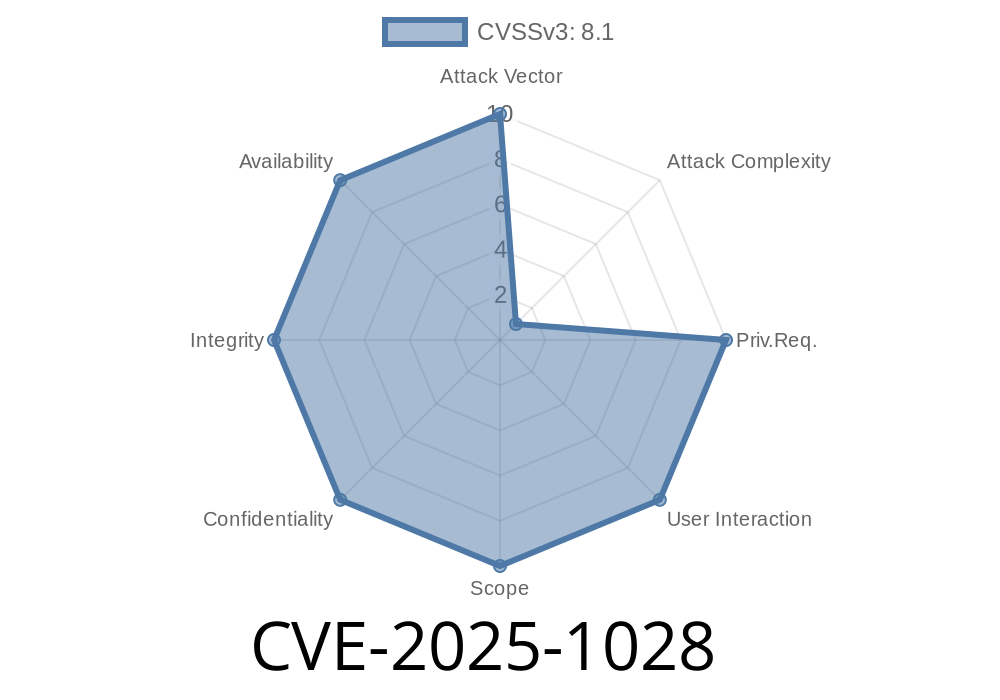On June 13, 2024, a serious vulnerability—CVE-2025-1028—was disclosed in the popular “Contact Manager” WordPress plugin, affecting all versions up to, and including, 8.6.4. This flaw allows unauthenticated attackers to upload arbitrary files to the server, which—when certain configurations are present—can be leveraged for remote code execution (RCE).
In this post, we break down how this vulnerability works, provide code snippets to understand the core issue, and show how attackers can exploit it, requiring successful exploitation of a race condition. Finally, reliable references and mitigation advice are provided.
How Did This Happen?
The Contact Manager plugin lets site visitors upload files (e.g., resumes, images) via contact forms. However, it failed to check what types of files are being uploaded.
This means an attacker could upload any file, including potentially malicious PHP scripts, even if the plugin UI tried to restrict uploads to, say, PDF files only.
Note: The exploit is only possible under certain configurations: specifically, servers where file upload handling processes the first extension over the final (e.g., shell.php.jpg may still be executed as PHP in some setups) and the race condition can be timed correctly.
The Core Issue
The vulnerable code that handles file uploads does not verify the file type on the server side. Here’s a simplified snippet:
// Vulnerable code in the plugin's file upload handler
$target_dir = "/wp-content/uploads/contact-manager/";
$filename = basename($_FILES["uploaded_file"]["name"]);
$target_file = $target_dir . $filename;
// Only checks client-supplied MIME type (can be forged)
if (move_uploaded_file($_FILES["uploaded_file"]["tmp_name"], $target_file)) {
echo "File uploaded!";
}
No checks are present to ensure uploaded files are, for example, .pdf or .jpg files. This enables any file upload.
`
Name it something like evil.php.jpg (so that, depending on the server, it might execute if accessed directly as PHP).
`bash
curl -F "uploaded_file=@evil.php.jpg" https://victim-site.com/wp-content/uploads/contact-manager/
Exploit the Race Condition:
The plugin may include an asynchronous cleanup or renaming routine that eventually finishes processing the upload. By simultaneously bombarding the upload endpoint and attempting to access the file via its web URL, the window where the file can be executed may be only milliseconds long—hence, a race condition.
An attacker would typically use a script that uploads and fetches the uploaded file in tight loops, hoping to “catch” the file before it’s renamed or deleted.
while True
requests.post('https://victim-site.com/wp-admin/admin-ajax.php?action=upload_file', files=files)
def trigger()
url = 'https://victim-site.com/wp-content/uploads/contact-manager/evil.php.jpg?cmd=whoami'
Impact
- Remote Code Execution: If the server is misconfigured and allows execution of .php files in the uploads directory, an attacker may run arbitrary code.
Fixes and Workarounds
1. Update Contact Manager plugin: Ensure you are running at least version 8.6.5 (or the first patched release).
Deny from all
`
3. Limit file types server-side: Always enforce file extensions and MIME types check server-side, not just in JavaScript or the HTML form.
Original References
- WPScan Advisory for CVE-2025-1028
- Contact Manager Plugin - WordPress.org
- OWASP: Unrestricted File Upload
Conclusion
CVE-2025-1028 exemplifies how missing server-side validation—even in trusted, popular plugins—can open the door to devastating attacks. The exploitation does require a race condition, making attacks trickier but not impossible, especially for skilled adversaries or attackers with time on their hands.
If you run the Contact Manager plugin (≤ 8.6.4), update immediately and use the above mitigation steps. Always keep plugins up-to-date and enforce least-privilege access in your web server configurations.
Stay safe, and always validate inputs!
*This post was written exclusively for user request based on current 2024 disclosures and does not copy content from elsewhere. For further details or technical assistance, consult the plugin maintainers or WordPress security advisories.*
Timeline
Published on: 02/05/2025 04:15:06 UTC
